* At the 27th ASEAN-Japan Summit, the leaders of the countries highly appreciated the success of the Summit to celebrate the 50th anniversary of the establishment of ASEAN-Japan relations in Tokyo in December 2023, and welcomed the positive developments in the relationship over the past time. Japan is ASEAN's 4th largest trading partner, with two-way trade reaching 239.4 billion USD, and is the 5th largest FDI investor in ASEAN reaching 14.5 billion USD in 2023.
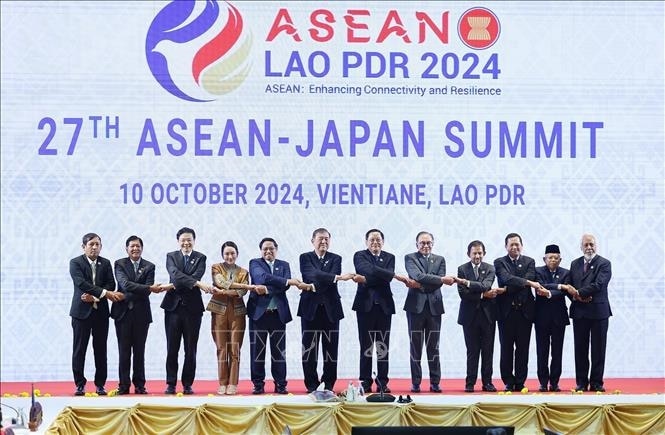 |
| Prime Minister Pham Minh Chinh, heads of ASEAN delegations and Japanese Prime Minister Ishiba Shigeru pose for a photo at the 27th ASEAN-Japan Summit. Photo: Duong Giang/VNA |
The leaders affirmed to continue to closely coordinate in implementing the commitments, initiatives and high-level outcomes of the commemoration, including the Joint Vision Statement and the Plan for Implementation of the Statement. Specifically, ASEAN and Japan will continue to promote economic , trade and investment cooperation, strengthen supply chains and infrastructure connectivity; enhance cooperation in defense, maritime security, combating transnational crimes, enhancing cyber security, and managing and responding to natural disasters.
The two sides will also give high priority to cooperation in science and technology, innovation, artificial intelligence, digital transformation, green infrastructure development, electric vehicle ecosystem, energy, climate change response, people-to-people exchange, and tourism.
Expressing his joy at attending the Summit for the first time, which was also his first overseas trip since taking office, Japanese Prime Minister Ishiba Shigeru emphasized the importance of the ASEAN-Japan comprehensive strategic partnership, which has been continuously strengthened and developed over 50 years on the basis of three pillars: “heart-to-heart partnership through generations”, “partnership in co-creating the future economy and society” and “partnership for peace and stability”.
Prime Minister Ishiba Shigeru also affirmed Japan's commitment to continue strengthening cooperation and supporting ASEAN in building a united ASEAN Community, enhancing connectivity and narrowing the development gap.
Speaking at the Conference, Prime Minister Pham Minh Chinh welcomed the success of the Summit to celebrate the 50th anniversary of ASEAN-Japan relations in December 2023, which is a historic milestone and the beginning of a new era of cooperation for bilateral relations.
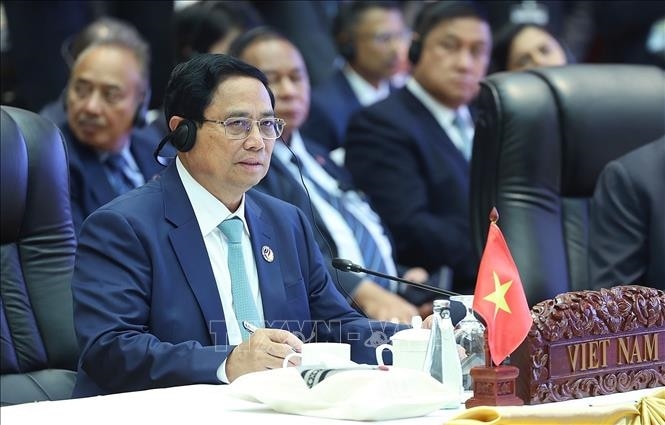 |
| Prime Minister Pham Minh Chinh speaks at the 27th ASEAN-Japan Summit. Photo: Duong Giang/VNA |
Emphasizing that economic-trade-investment cooperation should continue to be the main driving force, while promoting connectivity between the two economies, the Prime Minister encouraged Japanese enterprises to further increase investment in ASEAN, and suggested that Japan increase support for ASEAN enterprises to participate in Japanese enterprises' supply chains, develop supporting industries, and build a highly skilled workforce. In addition, it is necessary to promote new growth drivers from emerging fields such as digital transformation, semiconductors, cloud computing, the Internet of Things, energy conversion, green economy, circular economy, smart agriculture, etc.
In order to create a future of self-reliant and sustainable development, and enhance response to climate change, disasters, and natural disasters, Prime Minister Pham Minh Chinh proposed that Japan continue to cooperate and support ASEAN countries and the Mekong sub-region in responding to climate change, promoting energy transition and implementing emission reduction commitments, including through the “Asia Net Zero Emission Community” initiative.
Prime Minister Pham Minh Chinh stressed the need for both sides to strengthen strategic coordination for regional peace, security and stability, thereby requesting Japan to continue supporting ASEAN's common stance on the East Sea, peacefully resolving disputes, and making efforts to complete an effective and substantive Code of Conduct in the East Sea (COC) in accordance with international law, especially the 1982 United Nations Convention on the Law of the Sea (UNCLOS), towards building the East Sea into a sea of peace, stability, cooperation and sustainable development.
* At the 27th ASEAN+3 Summit (China, Korea, Japan), the leaders of ASEAN and the three Northeast Asian countries emphasized the importance of the ASEAN+3 cooperation framework, and highly appreciated the positive progress in ASEAN+3 cooperation in recent times. The implementation of the ASEAN+3 Cooperation Work Plan for the 2023-2027 period reached 55%, after only nearly 2 years of implementation. According to the report of the ASEAN+3 Macroeconomic Research Office (AMRO), despite many uncertainties, the economic growth rate of the entire ASEAN+3 region in 2024 is expected to reach 4.2% and is estimated to reach 4.4% in 2025. In 2023, the total two-way trade turnover between ASEAN and Northeast Asian countries will reach 1,100 billion USD, while the total FDI investment from the above countries into ASEAN will reach 42.8 billion USD.
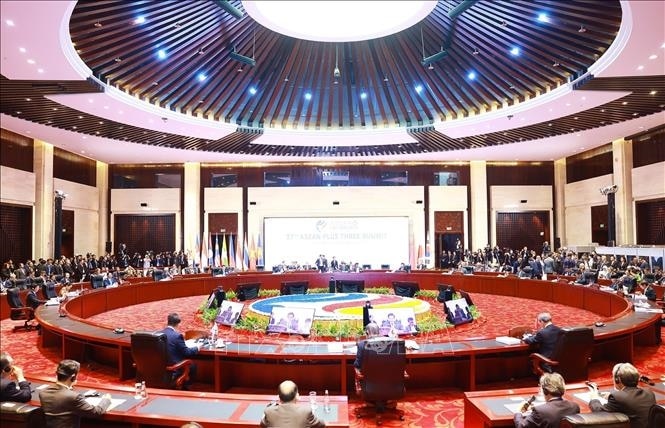 |
Leaders of ASEAN countries and partners agreed to continue to coordinate effectively in implementing the Work Plan, prioritizing cooperation in economics, trade, investment, and effectively implementing RCEP. The countries also emphasized cooperation in capacity building and promoting the effectiveness of existing cooperation mechanisms in the field to promptly respond to and handle challenges in non-traditional security, combating transnational crimes, food security, health security, etc. Leaders of the countries supported strengthening coordination and ensuring regional financial stability through implementing the Chiang Mai Initiative Multilateralization (CMIM) and the Fast Track Finance Mechanism, while promoting cooperation in innovation, digital transformation, electric vehicles, energy transition, climate change, etc. Leaders of the countries also emphasized promoting people-to-people exchanges, promoting the role and value of ASEAN+3 to contribute more positively to peace, stability, cooperation and development in the region.
Speaking at the conference, Prime Minister Pham Minh Chinh highly appreciated the important role of China, Japan and South Korea in maintaining stability, peace, cooperation and development in the region, affirming that the prosperous development of ASEAN cannot be achieved without the connection, cooperation and support of the +3 Partners in the past, present and future. Accordingly, the Prime Minister emphasized 3 orientations for developing ASEAN+3 cooperation in the context of complex and unpredictable regional and global changes.
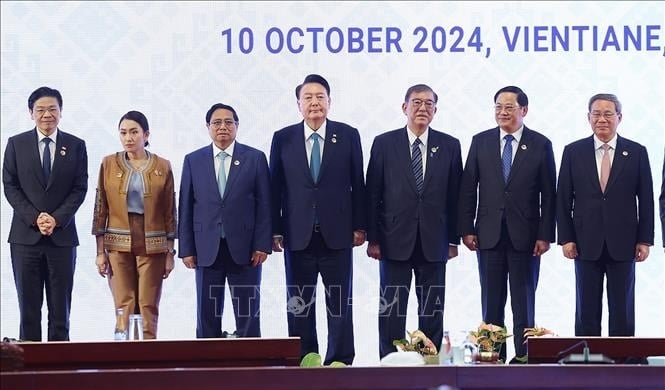 |
| Prime Minister Pham Minh Chinh, heads of ASEAN delegations and Chinese Premier Li Qiang; South Korean President Yoon Suk Yeol and Japanese Prime Minister Ishiba Shigeru pose for a group photo. Photo: Duong Giang/VNA |
Firstly, ensuring supply chain connectivity. The Prime Minister welcomed and proposed the early implementation of the ASEAN+3 Leaders’ Statement on Enhancing Regional Supply Chain Connectivity, aiming to promote infrastructure connectivity, facilitate trade and investment, stabilize finance, open markets, improve the efficiency of circulation and supply of goods, services and other activities, as well as build economic connectivity initiatives.
Second, taking advantage of new growth drivers. The Prime Minister emphasized the need to exploit the potential and opportunities for cooperation in science and technology, innovation, digital transformation, green transformation, circular economy, sharing economy, emerging industries and fields such as artificial intelligence, semiconductors, cloud computing, Internet of Things, etc., to bring practical benefits to people and countries in the region.
Third, self-reliance in the face of natural disasters and climate change. Thanking the +3 Partners for their support in economic recovery over the past years and overcoming the consequences and damage caused by the recent Typhoon Yagi, the Prime Minister suggested that ASEAN+3 step up cooperation in disaster management and damage reduction, enhance community resilience, and give higher priority to cooperation in energy transition, green transition, environmental protection, and climate change response. He also hoped that the +3 Partners would strengthen cooperation and support sustainable development of the Mekong sub-region.
Affirming the importance of a peaceful, secure and stable environment, free of war, favorable for development for countries and the whole region, Southeast Asia as well as Northeast Asia, Prime Minister Pham Minh Chinh emphasized that, regardless of any issue, the most important factor is to respect international law, the United Nations Charter, the 1982 UNCLOS Convention, frank dialogue, sincere cooperation, mutual trust and respect, resolving all disputes by peaceful means, joining hands to respond to global challenges, jointly shaping an open, inclusive, transparent regional structure, upholding international law with ASEAN playing a central role and the assistance and effective cooperation support of China, Japan and South Korea.
* At the 4th ASEAN-Australia Summit, the leaders highly appreciated the success of the Special Summit to celebrate the 50th anniversary of ASEAN-Australia relations in March 2024, and emphasized continuing to closely coordinate to implement the outcomes of the Special Summit, bringing the Comprehensive Strategic Partnership between the two sides to develop substantially, effectively and for mutual benefit.
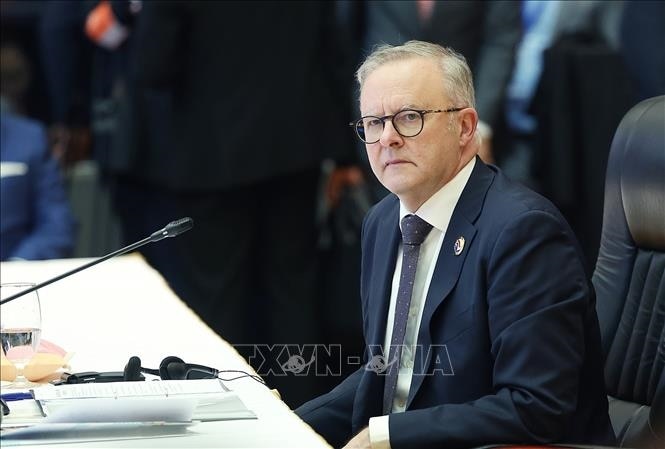 |
| Australian Prime Minister Anthony Albanese speaks at the fourth ASEAN-Australia Summit. Photo: Duong Giang/VNA |
Welcoming the positive developments in recent times, especially the two-way trade turnover between ASEAN and Australia reaching 94.4 billion USD and FDI investment from Australia to ASEAN reaching 1.6 billion USD in 2023, the leaders agreed to coordinate effectively implementing the commitments set out in the newly adopted Action Plan for the period 2025 - 2029, based on the orientation of the Joint Vision Statement and the Melbourne Declaration recently adopted at the Special Summit. The two sides will also coordinate to implement commitments and initiatives, including the Australia Future for ASEAN Initiative worth 204 million AUD, equivalent to 137 million USD, and the Southeast Asia Investment Fund worth 2 billion AUD.
Australian Prime Minister Anthony Albanese emphasized the importance of the Special Summit to celebrate the 50th anniversary of ASEAN-Australia relations, set out the direction for future development of bilateral cooperation in the coming decades, and committed to strengthening close and mutually beneficial cooperation with countries in the region to respond to challenges, seize opportunities, and build a more closely connected and resilient region, contributing to ensuring peace, security, stability and shared prosperity.
In his speech, Prime Minister Pham Minh Chinh suggested that ASEAN and Australia continue to closely coordinate and actively build the ASEAN-Australia Comprehensive Strategic Partnership for peace, prosperity and a future-oriented relationship.
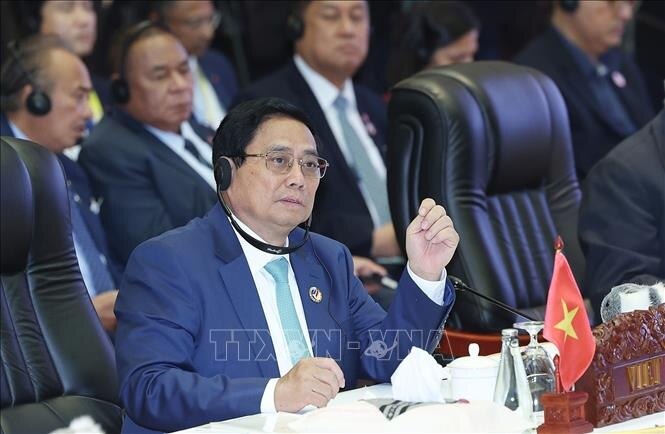 |
Appreciating the long-standing relationship with Australia, a sincere friend, a trusted partner who always helps each other when facing difficulties and challenges, Prime Minister Pham Minh Chinh suggested that the two sides should strengthen strategic coordination for peace and stability in the region, and highly appreciated Australia's continued active support for ASEAN's common stance on the East Sea, peaceful settlement of disputes, and efforts to complete an effective and substantive COC in accordance with international law, especially the 1982 UNCLOS, contributing to building the East Sea into a sea of peace, stability, cooperation and sustainable development.
Prime Minister Pham Minh Chinh stressed the need for both sides to coordinate to create breakthroughs in economic, trade and investment cooperation, while strongly promoting new growth drivers such as science and technology, innovation and digital transformation. Accordingly, it is necessary to effectively exploit highly complementary economic potentials, step up support for businesses, facilitate and further open the market for agricultural products, and diversify the supply chain.
Towards a future of inclusive and sustainable development for people and nations, Prime Minister Pham Minh Chinh proposed that ASEAN and Australia support each other to successfully implement sustainable development goals, through expanding cooperation, energy transition, green transformation, environmental protection, emission reduction, and climate change response.
Prime Minister Pham Minh Chinh welcomed Australia’s support for the development of the Mekong sub-region and thanked Australia for prioritizing support for Vietnam’s Mekong Delta region to develop in harmony with nature and adapt to climate change. In addition, the Prime Minister suggested the need to strengthen people-to-people exchanges and cooperation in education and training, especially hoping that Australia would provide more scholarships for students from ASEAN countries and develop high-quality human resources.








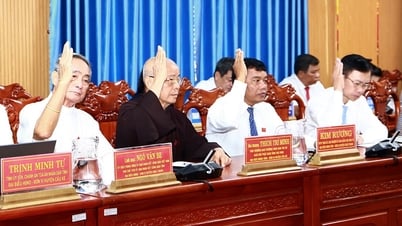

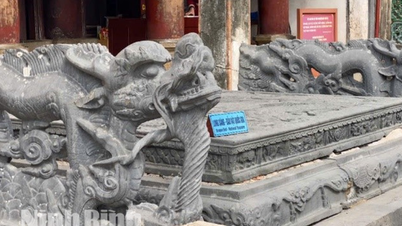


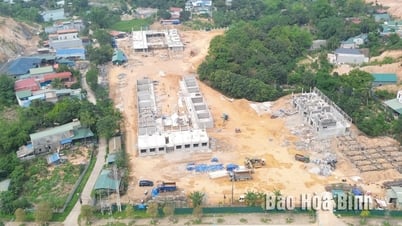
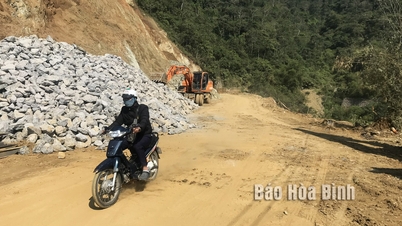




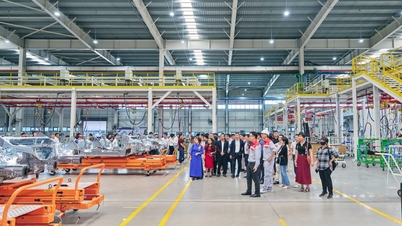
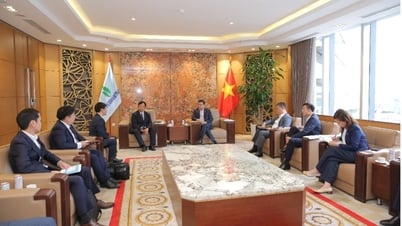
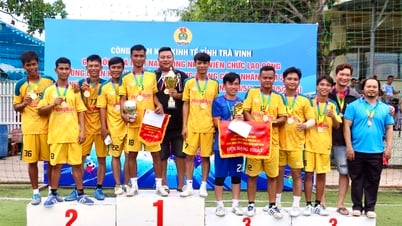
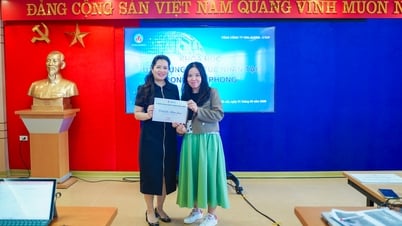

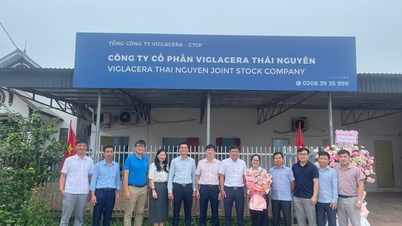









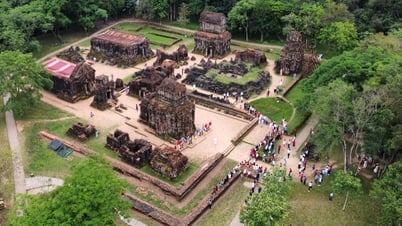









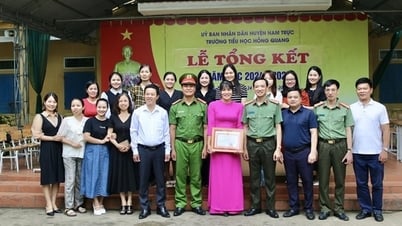











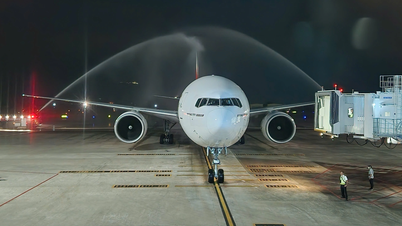
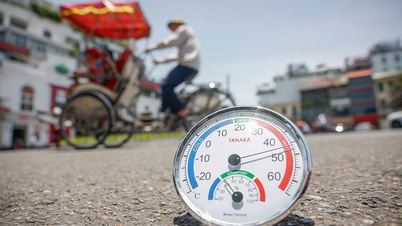



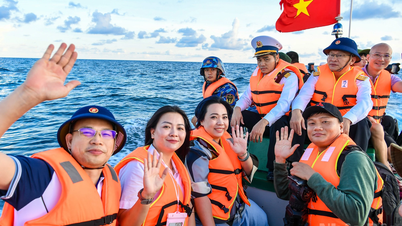




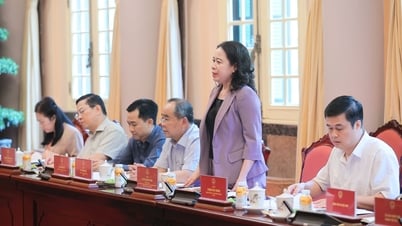





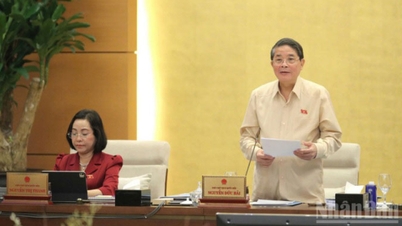




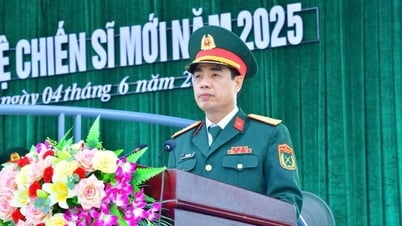

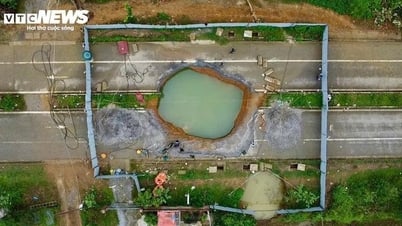









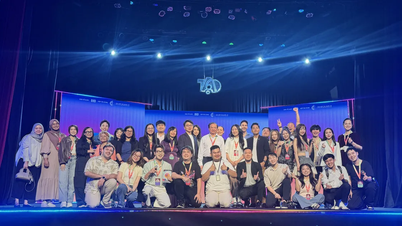

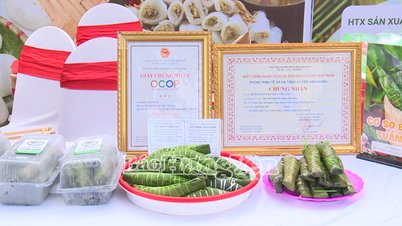





Comment (0)